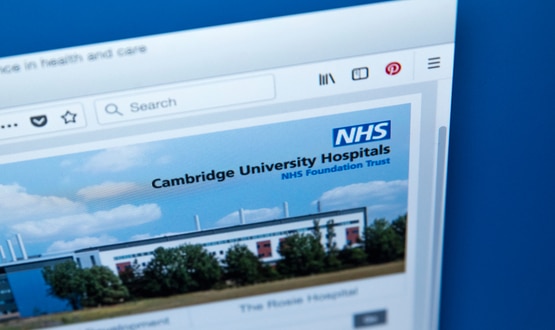Cambridge University Hospitals pens research deal with Sensyne Health
- 10 December 2021

Cambridge University Hospitals NHS Foundation Trust has signed a five-year non-exclusive Strategic Research Agreement (SRA) with Sensyne Health.
The agreement will give Sensyne Health access to three million de-identified patient records from Cambridge University Hospitals which will be used for clinical AI research which aims to help improve patient outcomes.
The trust will de-identify all data before it is passed to Sensyne and its usage will be operated under an agreed Data Processing Protocol. To facilitate safe and efficient data processing by Sensyne, the patient data will be stored securely within Cambridge’s Digital Research Environment which is supported by its Epic electronic health record (EHR).
Cancer research will be a key part of the partnership, along with Cambridge’s other specialisms of cardiovascular disease and rare diseases. By analysing cancer patient pathways, Sensyne can help to reduce patient waiting times and improve care.
In exchange for the data, the trust will receive 4,285,714 ordinary shares in Sensyne Health, bringing the total share ownership by NHS trusts to 16.2%. Cambridge University Hospitals will also receive £350,000 per year over the term of the contract for investment in IT to help enable the curation and analysis of data under the agreement.
The trust will also receive a royalty on revenues generated by Sensyne from the research undertaken in the scope of the SRA. This payment will be reinvested back into the NHS to benefit patient care.
Dr Ashley Shaw, medical director at the trust, said: “At CUH we use a wide range of research to constantly improve the lives of patients both locally and around the world. Sitting at the heart of Europe’s biggest life sciences campus, alongside some of the world’s most pre-eminent academics and industrial partners, we know the power of collaborations to bring about discoveries that will benefit us all.
“By searching large de-identified datasets, machine learning tools can spot patterns which are otherwise indiscernible, shedding light on causes of disease and opening up new treatment opportunities.”
The agreement between the two companies covers three million patient records and brings the combined total of de-identified patient data available for medical research to 25.5million patients across the UK and US. It also brings the number of Sensyne’s SRAs with NHS trusts and US health systems to 16 – including Great Ormond Street, Milton Keynes University Hospital, The Royal Wolverhampton and Royal Devon and Exeter.
Lord Drayson, chief executive officer of Sensyne Health, said: “Cambridge University Hospitals is also recognised as a leader in the use of digital tools and health data to improve patient care and has built a large, high quality data set as a result.
“The trust has invested heavily in its digital infrastructure and the curation of its data which means we can start work immediately. Together we aim to use the power of ethical AI to make a real difference in finding new and better ways to treat cancer and other complex diseases.”




